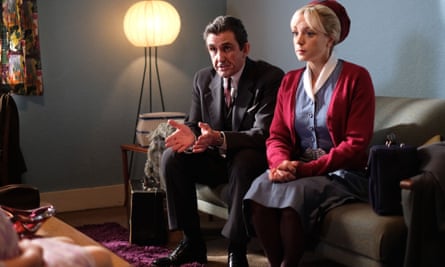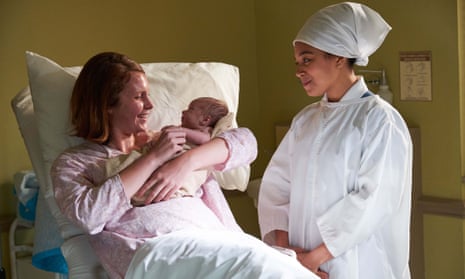If television were the real world, no one would want to live in the global homicide hotspot of Midsomer. Every woman, though, would beg to be a patient at Nonnatus House clinic in Poplar, East London, because the standard of healthcare is so extraordinary.
So far in season 10 of Call the Midwife, which concludes on Sunday, Dr Patrick Turner (Stephen McGann) and his team of midwives have diagnosed a case of gestational diabetes, a condition little understood at the dramatised time of 1966, and a very rare enzyme disorder, phenylketonuria.
Two exceptional illnesses in a few weeks were unlikely to worry personnel who have previously identified the uncommon genetic disorders osteogenesis imperfecta (season four) and achondroplasia (six), and encountered mothers suffering from leprosy (seven) and puerperal, or postpartum, psychosis (three). Even more impressively, Turner and his team spotted these problems by simple observation, without the pioneering screening schemes Nonnatus introduced for tuberculosis (two) and cervical cancer (eight), the latter testing regimen also uncovering an intersex patient in the surgery’s catchment area.
We tend to think of the titular hero of House as TV’s resident medical genius, a Sherlock Holmes of flesh and bones. But Dr Gregory House (Hugh Laurie) was running a department of diagnostic medicine at a big teaching hospital with access to all the scans and tests of 21st-century American medicine.
In contrast, Turner and the nuns/midwives are working in 1950s and 60s England, using little more than thermometers and abdominal listening horns, their patients drawn from a few postcodes.
When Call the Midwife eventually ends – it is currently commissioned through to series 13 in 2024 – the closing scene should, logically, be a jolly in Stockholm as Dr Turner celebrates his receipt of the Nobel prize in physiology or medicine. Indeed, as the doc has also treated characters dealing with post-traumatic stress disorder caused by the partition of India (this series) and the Cuban missile crisis (series five), they could throw in the peace prize as well.
These comments are affectionate criticism of a BBC One show that maintains consistently high ratings (around eight million viewers), lively writing (led by the series creator, Heidi Thomas) and exemplary ensemble acting: Stephen McGann’s Turner, Helen George’s Nurse Trixie Franklin, Nurse Phyllis Crane (Linda Bassett), Sister Julienne (Jenny Agutter) and, most recently, Leonie Elliott’s Nurse Lucille Anderson.

But as someone who studies historical accuracy in TV drama as closely as Dr Turner watches for obscure obstetric presentations, I am fascinated by Call the Midwife as a very distinctive case study.
Unlike Peter Morgan’s The Crown (Netflix, since 2016), in which dates and details are regularly falsified for narrative impact, or Downton Abbey (ITV, 2010-15), in which Julian Fellowes makes the English aristocracy of the 1910s and 20s more Liberal Democrat than seems likely, Thomas’s scripts raise different issues for TV’s history cops.
For example, in series six, when the midwives recognised a case of female genital mutilation (FGM) in a patient, some objected that Call the Midwife was misrepresenting 1962 by pulling forward what feels a more recent cause of outrage.
But as the practice of FGM was noted and criticised by missionary nurses in Africa early in the 20th century, the nun-midwives of Nonnatus House were perhaps more likely to have heard of the mutilation than the average medical practice. There might even have been cases among London’s immigrant population in the early 60s.
Medically, Call the Midwife tends to be broadly plausible. While cervical smear testing was not an NHS standard in 1964, there were trial schemes at that time. And although gestational diabetes was low on prenatal check lists in 1966, articles appeared in professional journals, one of which is read in Nonnatus House.
The improbability, rather, lies in one East End doctor encountering so many complications that affect a tiny minority of pregnancies. What Midsomer is to killing, Poplar has become to chromosomal deficiency.
The fault of Call the Midwife is not inaccuracy, but incredibly compressed reality, geographical maximalism. Another script tic – the mental effect of world events – can also be excused as a sensible attempt by Thomas to foreground period history, rather than just have it described in the background on radio or TV.
But, as is the case with any flaw in a successful TV series, the problem inevitably risks – like a chronic illness – becoming more acute as time goes on.
Next year’s 12th series will be set in 1967, and Thomas has already indicated that two key pieces of UK legislation that year – the decriminalisation of abortion and homosexuality respectively – will be of interest. We may also suspect that Nonnatus House patients will suffer PTSD from the Torrey Canyon oil spill and the Vietnam war.
But, intriguingly, December of that year saw the world’s first successful heart transplant (admittedly in Cape Town not Poplar). But imagine the scene, as one recently dead Nonnatus patient lies next to another in the final stages of heart failure, and Dr Turner shouts: “Trixie, I’ve got an idea – get me a kitchen knife!”
